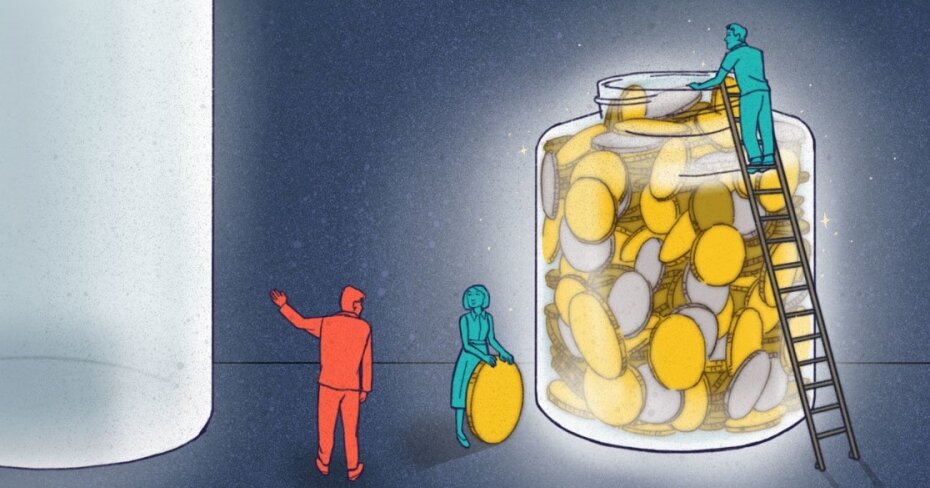Are we being told to save too much for retirement?
By: Lisa Coxon on July 12, 2019
Do you remember when the fear of having no money in retirement began to loom over your head? For me, it was sometime in my early 20s when my mom warned me that if I didn’t land a job at a company with a registered pension plan, which, even then, were already on the decline, I would be on the hook for most — if not all of — my retirement savings.
That idea really scared me.
A similar message has made its way into the ears of other millennials. According to a 2016 survey by Tangerine, some 62% of millennials have started saving for retirement — and almost half started before the age of 25.
But of the 38% of millennials who aren’t saving for retirement, 62% said it’s because they don’t earn or have enough money. And yet everyone from banks to personal finance experts say we should be saving aggressively from as early on as possible.
Is it possible we’re being sold too much fear?
‘A wild exaggeration’
The steady decline of jobs that offer registered pension plans (RPPs), which so many baby boomers like my mom have benefited greatly from in retirement, means that millennials and Gen Zers will be responsible for much of their retirement savings — and so the sooner they start saving, they’re told, the better off they’ll be.
“Almost all Canadians seem to be told that they should be saving as much as humanly possible all of the time,” says retirement expert Malcolm Hamilton. “And that is a wild exaggeration and generalization.”
But it didn’t materialize out of nowhere.
Before we had a fully mature Canada Pension Plan (CPP) and before the Guaranteed Income Supplement (GIS) was the size it is today, there was a lot of fear around retirement savings because a lot more people were living in poverty.
Now, those who retire at age 65 can expect an average of $679.16 a month from CPP. This is based on how long you’ve contributed to the pension plan for during your working years.
GIS payments for those with lower incomes are tied to the Old Age Security (OAS) pension, and are based on annual income and marital status. For a single person receiving OAS, their monthly GIS payments can range anywhere from around $600 to $1,500. For a common-law spouse of someone who receives the OAS, GIS payments range from around $600 to $1,100.
Even though these benefits have fully matured and grown in size, residual retirement savings anxiety continues to be perpetuated by financial institutions, personal finance experts, and even the government. Why?
“In the case of the financial industry, the motivation is pretty obvious,” says Hamilton. “It’s good for their business.”
“It’s important for Canadians to understand the difference between a retirement savings strategy that’s designed for the saver and a retirement savings strategy that’s designed for a financial institution that sells products to savers,” says Hamilton.
Almost all Canadians seem to be told that they should be saving as much as humanly possible all of the time. And that is a wild exaggeration
The government is also a good broadcaster of this message because if people are oversaving, says Hamilton, it will cost the government less to support them when they retire.
But these groups aren’t knowingly doling out bad advice. They’re just not putting forth the most suitable remedy.
“They don’t spend a lot of time trying to question whether the prescription is appropriate,” says Hamilton. “And you can sort of tell that the prescription is inappropriate because if it were true, we would have armies of elderly Canadians who have miserable standards of living and are completely dissatisfied. When in fact, the levels of financial satisfaction amongst the elderly in Canada are as high if not higher than the levels of satisfaction for younger people.”
A United Way study released in May revealed that seniors in Toronto are now actually earning more on average than young adults. According to the study, those 65 and older saw a 54% increase in their average annual income between the years of 1980 and 2015 when their average annual income went up by more than $17,000 — to $49,400, from $32,200 (in 2015 dollars). People between the ages of 25 and 34, however, saw their average annual income drop during this same time period, from $42,300 to $41,800.
To be fair, when many of these seniors were putting their money into GICs, chances are good they were seeing 8 or 10% returns, meaning they could live off their interest income pretty comfortably in retirement. For today’s savers, those returns are more like 2%.
Still, says Hamilton, “These more-than-average-financially-satisfied seniors were told their whole lives that they weren’t saving enough and that there would be a terrible day of reckoning and they would be miserable and impoverished in their retirement. And then in their 70s, the penny drops that, in fact, that’s just not the case.”
That’s in no small part thanks to the alleviation of major financial burdens — like supporting children and paying for a mortgage — in retirement.
“So,” says Hamilton, “they have what looks like a modest income on which they live very comfortably.”
Standard of living should determine savings
When we talk about how much we should be saving for retirement, what we should really be talking about is how much money will allow us to live as comfortably as we do pre-retirement.
That’s going to mean something very different to people of different incomes.
How much we ought to be saving “isn’t even an answerable question,” says Hamilton. “It’s really not knowable because it depends very heavily on what happens to interest rates and the stock market, because that’s where the savings go.”
There will be generations, Hamilton says, who wind up saving too little but get lucky because they either come into a nice inheritance or live through a time of high interest rates and well-performing stock markets. And there will be those who don’t have enough money in retirement because their returns were terrible.
“The goal isn’t for everybody to retire with the same income,” says Hamilton. “The goal is for everyone to be able to maintain in retirement the standard of living that they were able to afford up to that point in time.”
Which brings us to an idea that, at first blush, sounds somewhat counterintuitive: “Low-income people should save,” says Hamilton, “but not really for retirement.”
You would think that a low-income person or family ought to save all that they possibly can for as long as they possibly can so that when their meagre income runs out, they have a nest egg to live off of in retirement.
Low-income people should save, but not really for retirement
But, says Hamilton, “If you’re a minimum wage worker in Canada, in all likelihood your government pension when you retire at 65 will provide you with the same take-home pay you were earning while at work, even if you’ve saved nothing.”
Fred Vettese, former chief actuary at Morneau Shepell and author of Retirement Income for Life, agrees. He believes that anyone earning less than half of the CPP ceiling (so, $25,000-$30,000 a year) shouldn’t be concerned with saving for retirement because government benefits like the OAS and the GIS will do a good job of replacing what they were earning before retirement. If they actively save for retirement, he says, “They’re just cutting into the GIS that they’re going to get in retirement.”
Government pensions won’t, however, go very far in replacing the income of high-earning Canadians. A doctor, for instance, who earns $200,000 a year and wants to maintain the same standard of living in retirement, should be socking away quite a bit of money in preparation for retirement. Someone in that situation should probably be maximizing their RRSP and TFSA every year.
Low-income Canadians, on the other hand, are likely going to have a hard time maxing out their RRSP and TFSA every year, especially if they’re carrying a mortgage, other debts, and still supporting children.
“When you’re carrying that kind of a burden you can ill afford to be saving large amounts for retirement at the same time,” says Hamilton.
‘Some dark clouds’ for the future
The existential dread Canadians are so often sold around saving for retirement may not be the answer. But that doesn’t mean there aren’t concerns about how retirement might look in the future.
“There are some dark clouds,” Vettese says.
One: OAS is slowly shrinking relative to the average wage. “OAS goes up with price inflation,” says Vettese, “whereas wages go up a little faster than price inflation.”
Two: we’re living longer than we used to, which means our savings will need to stretch farther than before.
Three: interest rates may continue to stay low for the next generation, which Vettese attributes not to a recession but to an aging demographic. “There are a lot more people over 50 and 60 who have money and are trying to find a place to park that money to earn interest,” he explains.
“And there are fewer people under 40 with demands for loans — to buy a house, to lease a car, to raise their children and so on. So there’s a greater supply of money and less demand for money in general.” This means returns could remain pretty lousy for future generations.
In the case of the financial industry, the motivation is pretty obvious, says Hamilton. It’s good for their business
“These are all trouble spots,” says Vettese.
Still, that doesn’t mean that there’s need for panic right now.
If your circumstances and income level allow you to start saving for retirement, then you’re probably wondering two things: how much should I save? And when should I start?
While there’s no magic percentage of our income that we all should — or can — save, Vettese has run the numbers. Looking at several historical 30-year periods, he found that, assuming a retirement age of 63, saving 10% of your gross income for retirement is a pretty good rule to follow. In fact, during some 30-year periods, 10% was actually more than enough.
As for when you should start saving, both Vettese and Hamilton like the idea of no later than age 35. They say to start worrying if you get into your 40s and haven’t made significant progress.
And don’t bend to the tremendous pressure to start saving before then — especially if your income is so low that you can’t, or shouldn’t need to, save for retirement at all. As Hamilton says, this fear-based narrative that we’re not saving enough and that we’re irresponsible with our money is one that’s been passed down from generation to generation.
“The message never changes,” he says. “And at its heart, it isn’t a financial story. It’s a morality tale.” Old people accuse young people of overspending and mismanaging their money. Then those young people grow up to be old people and the cycle repeats itself.
“It would be wrong to say that young people are irresponsible and they’re not saving enough,” adds Vettese.
“That totally ignores the fact that they just can’t save as much if they want to have any kind of quality of life at all because things have changed.”
Illustration by Taryn Gee.


